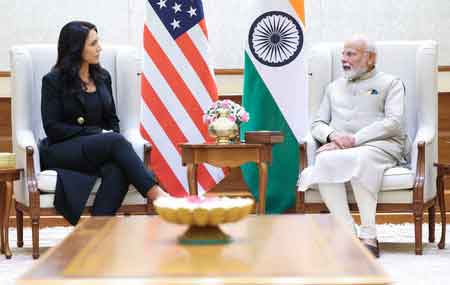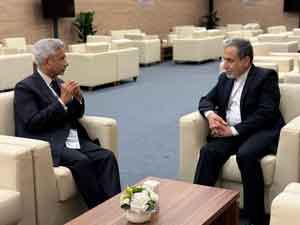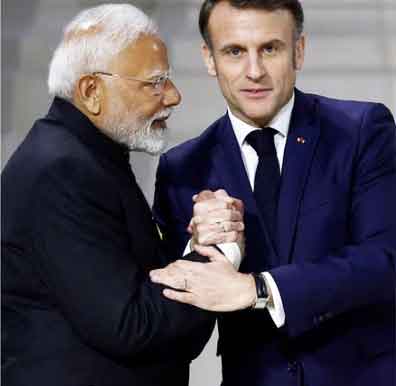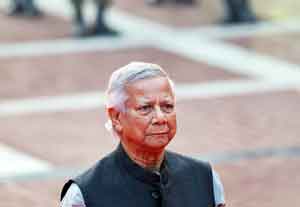Ajay Banga, the World Bank's new President, called for the private sector to play a larger role to help emerging countries in their battle against climate change in his first interviews on Sunday.
He argued that countries from countries -- essentially of the developed world, the World Bank, philanthropies and multilateral development banks (MDBs) will not be enough to meet the requirements of the emerging markets to help them transition from fossil fuel to clean fuel.
"The only way forward is to find a way to get the private sector to believe that this is part of their future," said Banga, who took charge on June 2 as the 14th President of the World Bank, to CBS news.
He spoke also to CNN and made a similar pitch for scaling up private sector participation.
"What I think we have to do is... to find ways in the MDB system to think of a different playbook -- to take on the risks that they cannot take on," he added.
Banga is the first Indian-American to hold this position and called himself "Made in India" in the CNN interview, when he asked about the need for someone other than an American should lead the World Bank, which has always been headed by an American in an unwritten agreement with Europe, which, in return, gets to name the head of the International Monetary Fund.
Banga said he was born and raised in India and worked in both the developed and developing world and, thus, embodies the kind of diversity people may want to see at the leadership level.
Developing and less developed countries have long argued that in order to transition to clean energy they need help in resources and technology from the developed countries who caused most of the global warming with large-scale and unregulated industrialisation. And a climate fund set up to that effect has fallen way short of the committed targets.








Tripura CM Saha holds key meeting with BJP, IPFT and TMP leaders
Tripura Chief Minister Manik Saha on Friday held an "important" meeting between the leaders of ruling BJP and its two allies – Tipra Motha Party (TMP) and Indigenous People's Front of Tripura (IPFT) and discussed various political and developmental issue, sources said.
HM Amit Shah's meeting sends a clear message: Not a drop of water to Pakistan
A high-level meeting was held on Friday at the residence of Union Home Minister Amit Shah regarding the suspension of the Indus Waters Treaty. The 45-minute meeting between the Home Minister and Union Jal Shakti Minister C.R. Patil focused on exploring ways to halt the flow of water to Pakistan.
Tripura: TMP chief urges Centre to adopt 'stronger policy' against B'desh
Ruling BJP’s ally Tipra Motha Party (TMP) founder-chief Pradyot Bikram Manikya Debbarma on Friday urged the Central government to adopt a stronger policy stance towards Bangladesh, accusing the neighbouring country of encouraging fundamentalist forces targeting Hindu minorities.
Pahalgam attack: More countries express solidarity with India, offer support in fight against terrorism
Ambassadors of Israel, Egypt, Argentina, and Nepal met External Affairs Minister (EAM) S. Jaishankar in New Delhi on Friday, expressing solidarity with India in its fight against terrorism following the heinous terror attack in Pahalgam.
Tripura CM directs SPs and DMs to remain vigilant about Pakistani nationals
Tripura Chief Minister Manik Saha on Friday directed the Superintendents of Police (SPs) of all eight districts to regularly share necessary inputs with the Chief Minister’s Secretariat regarding the presence of any Pakistani nationals in the state, officials said.
US supports India's 'hunt' for those behind 'horrific Islamist terrorist attack' in Pahalgam, says Gabbard
Tulsi Gabbard, Director of National Intelligence (DNI), on Friday said that the United States supports India's "hunt" for the perpetrators of the "horrific Islamist terrorist attack" in Pahalgam that took place earlier this week.
Tehran stands ready to 'forge greater understanding' between India and Pakistan: Iran FM Araghchi
Citing its good relations with both India and Pakistan, Iran on Friday said that it stands ready to "forge greater understanding" between New Delhi and Islamabad following the Pahalgam terror attack, earlier this week.
PM Modi's action will act as deterrent against any fresh attempts to harm India: Tripura CM
Tripura Chief Minister Manik Saha on Friday denounced the Pahalgam terror attack, asserting his staunch belief that Prime Minister Narendra Modi's decisive action will act as a strong deterrent against any future attempts by terrorists to harm India.